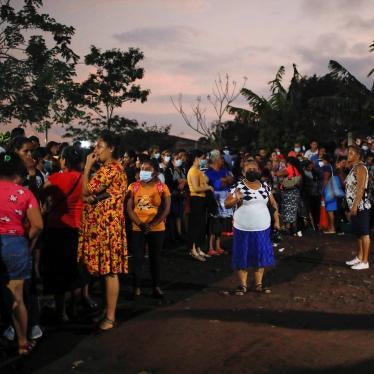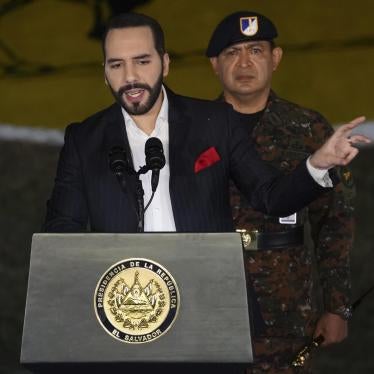For decades, gang violence has been Salvadorans’ major security concern. Salvadoran gangs forcibly recruit children and sexually assault, kill, abduct, rape, and displace people. The response by prior governments typically oscillated between two failed strategies: obscure negotiations with gangs and iron fist security policies that led to rights violations. Investigative work by El Faro indicates that, despite a massive official campaign, the strategy put forward by President Nayib Bukele’s government has been no different.
Gang violence has been endemic in El Salvador for decades. The country went from having 6,000 active gang members in 2003 to an estimated 86,000 as of April 2021, according to recent figures provided by Bukele. With El Salvador once called the “homicide capital of the world,” the murder rate reached a peak of 105 homicides per 100,000 people in 2015, to later decline. The number of homicides has sharply decreased since Bukele took office in 2019, reaching a historic low of 17.5 homicides per 100,000 people in 2021.
Publicly, Bukele has attributed El Salvador’s decline in homicides to the “Territorial Control Plan,” his flagship national security strategy, which purportedly involves modernizing the country’s security forces, increasing their presence across the country, with a focus on gang strongholds, as well as some initiatives to support underprivileged communities.
But the El Faro investigation tells a different story, supported by compelling evidence, including intelligence reports, testimonies by former prosecutors, and audio recordings. El Faro reported that high-level government officials have been secretly negotiating with gangs since Bukele took office. They offered jail privileges to imprisoned gang members and employment opportunities to those outside of prison, El Faro found, in exchange for the gangs’ commitment to lower homicide rates and provide political support during the 2021 legislative elections. Bukele has denied these allegations.
Yet a killing spree that left 87 Salvadorans dead between March 25 and 27 revealed that gangs remain capable of unleashing random waves of violence from one day to the next. On May 17, El Faro reported that the spike in homicides was due to the breakdown of a secret agreement between the government and the MS-13 gang.
The government’s response to these killings came quickly. The authorities and pro-Bukele legislators declared a 30-day “state of emergency” that suspended a range of constitutional rights, deployed thousands of soldiers and police officers to conduct raids throughout the country, and passed sweeping legal amendments that violate basic due process guarantees and children’s rights. The Legislative Assembly extended the state of emergency twice for a period of 60 days.
More than 38,000 people suspected of gang membership had been detained as of June 8, according to official figures. Human Rights Watch, Cristosal, and other rights groups have found evidence of gross human rights violations, including arbitrary detention seemingly based on individuals’ appearance and social background, as well as short-term enforced disappearances.
Despite Bukele’s repeated attempts to distance his administration from previous Salvadoran presidencies, his punitive measures are strikingly similar to past security policies. Since the implementation of the “Iron Fist Plan” (Plan Mano Dura) in 2003 —and later versions of similar measures enacted by subsequent administrations— security policy in El Salvador has mostly consisted of trying to suppress gangs, including through detaining people merely suspected of belonging to a gang, tougher laws for gang membership, and militarized policing.
Mass imprisonment has been at the center of these measures and their principal crime reduction strategy. The result has been gross human rights violations, including prison overcrowding.
According to the World Prison Brief, a worldwide database of prison populations, the number of prisoners in El Salvador was over 7,000 in 2000. That number had increased to more than 36,000 by December 2020—not including the tens of thousands allegedly detained during the more recent state of emergency. In 2018, prison overcrowding got to the point that a special observer sent by the United Nations described the conditions in El Salvador’s prisons as “pretty hellish.” There’s little reason to think the situation is any better now.
The iron fist strategy implemented by prior administrations has been ineffective. Gang membership has increased and violence, including disappearances and extortions, continues to shape the lives of Salvadorans. Some experts say that the rise of the prison population served to consolidate gang power within the prisons, by allowing gang members to make them a base for their criminal activities.
El Salvador has also had experience with gang truces. In 2013, gangs brokered a truce with then-President Mauricio Funes, which at first led to a sharp drop in homicides. However, the reduction in violence was short lived and was followed by a return to homicides and increased violence afterward.
Any serious initiative aimed at dismantling gangs and reducing crime needs to address the structural causes of gang membership, including the social marginalization that leads youth into gangs and the lack of rehabilitation programs to offer former gang members employment and education opportunities. Both prevention and rehabilitation strategies require allocating public resources to address the socioeconomic disadvantages associated with gang formation and criminal behavior.
Moreover, governments should aim at strengthening democratic institutions in El Salvador, including by promoting judicial independence. Independent courts and prosecutors are needed to ensure justice for the victims of gang violence and to take serious steps to dismantle the gangs.
Instead, Bukele’s government has weakened democratic institutions to the point that there are virtually no independent institutions left to act as a check on executive power. His government has portrayed security as a fair trade for human rights and the rule of law. The history of gang violence in El Salvador proves him wrong.









